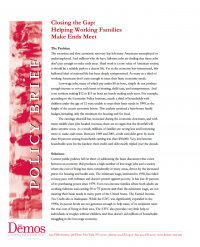Current public policies fall far short of addressing the basic disconnect that exists between an economy that produces a high number of low-wage jobs and a society where the cost of living has risen considerably in many areas, driven by the increased prices for housing and health care. The minimum wage, instituted in 1938, has failed to keep pace with inflation and doesn't protect against poverty. It has lost 24 percent of its purchasing power since 1979. Even two-income families where both adults are working full-time and earning 50 or 75 percent more than the minimum wage, are not meeting their basic needs in many parts of the United States. The Earned Income Tax Credit also is inadequate. While the EITC was significantly expanded in the 1990s, its payout levels are not generous enough to help many of its recipients meet the true cost of living in their area. The EITC also provides very little help to individuals or couples without children, and thus doesn't aid millions of households struggling in the low-wage economy.
It is time to get serious about helping working Americans afford a decent life and make it into the middle class. It is time for new initiatives designed to ensure that hard work is respected and rewarded in our 21st century economy.

